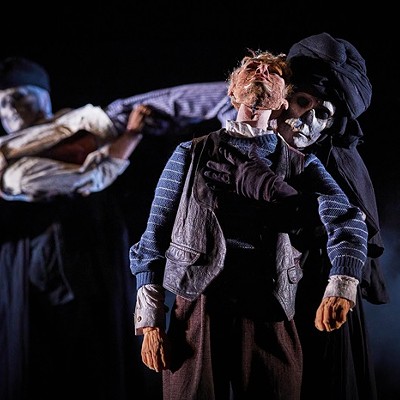Director Monteze Freeland, along with the cast and creative team of City Theatre’s newest production, has taken great care to respect Clyde’s, the creation of Pulitzer Prize-winning playwright Lynn Nottage. Although Nottage’s characters are fictional, in Clyde’s, running now through Sun., Oct. 16 at City Theatre’s South Side mainstage, they face the very real obstacles of life after prison.
The show explores the life experiences of Montrellous, Leticia, Rafael, and Jason, all of whom have been recently released from prison and are employees at the titular sandwich shop in Reading, Pa. The play ponders whether they will be allowed to put their criminal charges behind them, or if they have instead fallen irreparably into a cycle of victimization in which now that they’ve been marked as criminals, they are susceptible to coercion by anyone who can dial 9-1-1.
Owner Clyde (Latonia Phipps) hires formerly incarcerated people not out of the goodness of her heart, but rather as a shrewd business decision. Clyde is hard because she’s had a hard life. She is also formerly incarcerated and knows what it’s like to be exploited. Now that she’s managed to open her own sandwich shop, she seems singularly interested in getting ahead by exploiting her vulnerable employees.
Clyde physically assaults, sexually harasses, and verbally berates her kitchen staff, and the threat of police violence hangs over every interaction in this otherwise bright comedy; when Clyde is displeased with her employees, she threatens to send them back to prison, and she really does have the power to do that. Pennsylvania is known for its expansive probation and parole system, in which judges exercise a lot of discretion and can require someone to keep a job as a condition of their probation. Losing a job could easily get someone on probation arrested and jailed.
In the middle of these intractable circumstances, four eminently lovable characters struggle to find stability, satisfaction, and joy.
Montrellous, played with tremendous compassion by Khalil Kain, makes sandwiches that may be magical. He can transform a collection of ingredients at a truck-stop sandwich shop into a cohesive whole that’s greater than the sum of its parts, in the process doing the same with Clyde’s kitchen staff. The sandwiches also seem capable of bending time and space.
Despite his previous incarceration and current dead-end job, Montrellous is able to maintain his sense of agency and reclaim some contentment for himself. As he rhapsodizes about sandwiches, his sense of purpose and his enthusiasm for the sandwich arts prove contagious, quickly spreading to his coworkers and helping rebuild their self-worth and sense of efficacy.
Letitia (Saige Smith), who goes by Tish and supports her disabled daughter, and Rafael (Jerreme Rodriguez) are Montrellous’ chief disciples, bringing humor and, sometimes, chaos to the kitchen, always returning to their desire for growth and change.
Jason (Patrick Cannon), the only white character, is covered in racist gang tattoos he collected during his time in prison. Jason hails from another of Nottage’s Reading-set plays, Sweat, which dramatizes the circumstances of Jason’s arrest stemming from his behavior during a heated labor dispute at a steel mill. Cannon, who also played Jason in Pittsburgh Public Theatre’s 2018 production of Sweat, tells Pittsburgh City Paper that, to the best of his knowledge, he’s the first and only actor to portray Jason in both plays.
All five excellent performances are framed by Tony Ferrieri’s aesthetically pleasing, back-of-house set dynamically lit by designer Jason Lynch. Sound design by Twi McCallum brings the sizzle of the griddle to the stage, and KJ Gilmer’s costumes appear both deliberate and effortless, looking like they walked in straight off the street.
There’s a tension running through the play’s efforts to bring humanity to traditionally dehumanized subjects — formerly or currently incarcerated people do not owe anyone details about their charges, nor can one reliably assume that the circumstances that led to those charges will illuminate anything about that person. Still, in Clyde’s, the retelling of the circumstances that lead to each character’s arrest seems to be the cost of being presented to the audience as fully human.
We learn very little about Clyde’s past, and she remains the play’s cartoonish antagonist. Jason gains a sympathetic place in the narrative only after he expresses sufficient regret about his assault charge. Montrellous is presented as fundamentally different from the others in the kitchen and the circumstances of his incarceration turn out to reflect that, as well.
The idea that we can’t fully understand an incarcerated person until we know what they did to “deserve it” is closely related to the belief that there is something inherently different between people in prison and people out of prison (there isn’t) — both are ideological pillars of mass incarceration, and it’s disappointing to find them even here, baked into a play that seems to suggest a less deterministic relationship between criminal charges and identity.
Perhaps relatedly, the script is a bit undercooked — there’s too much meaning piled on top of the sandwich metaphor and the internal logic governing the play’s supernatural elements was not quite apparent. But the script is also genuinely empathetic, warm, and funny.
According to American Theatre magazine, Clyde's will be the 2022-2023 season's most produced play nationwide. Audiences would be well-served to catch it at City Theatre while it's fresh.
Clyde's. Continues through Sun., Oct. 16. City Theatre. 1300 Bingham St., South Side. $20-32. citytheatrecompany.org



















